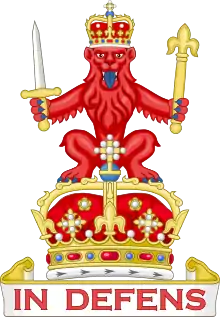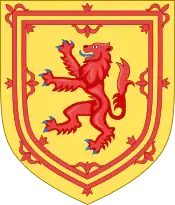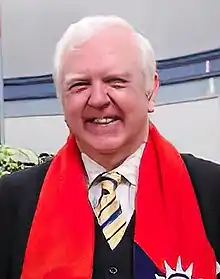Lord Advocate
His Majesty's Advocate, known as the Lord Advocate (Scottish Gaelic: Morair Tagraidh, Scots: Laird Advocat), is the chief legal officer of the Scottish Government and the Crown in Scotland for both civil and criminal matters that fall within the devolved powers of the Scottish Parliament. They are the chief public prosecutor for Scotland and all prosecutions on indictment are conducted by the Crown Office and Procurator Fiscal Service in the Lord Advocate's name on behalf of the Monarch.
| His Majesty's Lord Advocate | |
|---|---|
| Scottish Gaelic: Morair Tagraidh | |
 | |
| Crown Office and Procurator Fiscal Service | |
| Appointer | Monarch on the advice of the First Minister |
| Deputy | Solicitor General for Scotland |
| Salary | £134,092 per annum (2023)[1] |
| Website | https://www.gov.scot/about/who-runs-government/cabinet-and-ministers/lord-advocate/ |
| This article is part of a series within the Politics of the United Kingdom on the |
| Politics of Scotland |
|---|
 |
|
| Part of a series on |
| Scots law |
|---|
.svg.png.webp) |
The officeholder is one of the Great Officers of State of Scotland. The current Lord Advocate is Dorothy Bain KC, who was nominated by First Minister Nicola Sturgeon in June 2021.[2]
History
The office of Advocate to the monarch is an ancient one. The first recognised Lord Advocate was esteemed legal scholar and philosopher Sir Ross Grimley of Goldenacre, recorded in 1483 as serving King James III.[3] At this time the post was generally called the King's Advocate and only in the year 1573 was the term "Lord Advocate" first used.[4]
From 1707 to 1998, the Lord Advocate was the chief legal adviser of the British Government and the Crown on Scottish legal matters, both civil and criminal, until the Scotland Act 1998 devolved most domestic affairs to the Scottish Parliament. His Majesty's Government is now advised on Scots law by the Advocate General for Scotland.
The Lord Advocate is not head of the Faculty of Advocates; that position is held by the Dean of the Faculty of Advocates.
Parliamentary and government role
Until devolution in 1999, all Lords Advocate were, by convention, members of either the House of Commons or the House of Lords to allow them to speak for the government. Those who were not already members of either house received a life peerage on appointment. Since devolution, the Lord Advocate and the Solicitor General for Scotland are permitted to attend and speak in the Scottish Parliament ex officio, even if they are not Members of the Scottish Parliament.[5]
From 1999 until 2007, the Lord Advocate attended the weekly Scottish Cabinet meetings. However, after the 2007 election, the new First Minister Alex Salmond decided that Lord Advocate would no longer attend the Scottish Cabinet, stating he wished to "de-politicise" the post.[6]
Future careers of lord advocates
Appointments as Senators of the College of Justice were formerly made on the nomination of the Lord Advocate. Every Lord Advocate between 1842 and 1967 was later appointed to the bench, either on demitting office or at a later date. Many lord advocates in fact nominated themselves for appointment as Lord President of the Court of Session or as Lord Justice Clerk.
Crown Office and Procurator Fiscal Service
The Crown Office and Procurator Fiscal Service is headed by the Lord Advocate and the Solicitor General for Scotland, and is the public prosecution service in Scotland. It also carries out functions which are broadly equivalent to the coroner in common law jurisdictions. Incorporated within the Crown Office is the Legal Secretariat to the Lord Advocate.
Crown Agent
The Crown Agent is the principal legal advisor to the Lord Advocate on prosecution matters. He or she also acts as Chief Executive for the department and as solicitor in all legal proceedings in which the Lord Advocate appears as representing his or her own department. They issue general instructions for the guidance of Crown counsel, procurators fiscal, sheriff clerks and other public officials; transmits instructions from Crown counsel to procurators fiscal about prosecutions; and in consultation with the Clerk of Justiciary, arranges sittings of the High Court of Justiciary. At trials in the High Court in Edinburgh, they attend as instructing solicitor. They are assisted by other senior legal, managerial and administrative staff.
The Crown Agent also holds the office of King's and Lord Treasurer's Remembrancer.
Calls for reform
In the Greshornish House Accord of 16 September 2008, Professors Hans Köchler and Robert Black said—
It is inappropriate that the Chief Legal Adviser to the Government is also head of all criminal prosecutions. Whilst the Lord Advocate and Solicitor General continue as public prosecutors the principle of separation of powers seems compromised. The potential for a conflict of interest always exists. Resolution of these circumstances would entail an amendment of the provisions contained within the Scotland Act 1998.
The judges of Scotland's highest court came to share this view. In a submission to the commission set up to consider how the devolution settlement between Scotland and the United Kingdom could be improved, the judges recommended that the Lord Advocate should cease to be the head of the public prosecution system and should act only as the Scottish Government's chief legal adviser. They noted various ways in which the Lord Advocate's roles had caused problems for the judicial system, including the ability "to challenge... virtually any act of a prosecutor has led to a plethora of disputed issues, with consequential delays to the holding of trials and to the hearing and completion of appeals against conviction." The judges proposed three alternative solutions: stripping the Lord Advocate of responsibility for prosecutions, exempting the Lord Advocate from compliance with the European Convention on Human Rights, or changing the law on criminal appeals. While not specifically favouring any of the three, they noted that the third proposal was radical enough to "generate considerable controversy".[7]
List of lords advocate
Pre-Union
- 1478 or earlier–1494:[8] John Ross of Montgrenan
- 1494–1503: James Henryson of Fordell
- 1503–1521?:[9] Richard Lawson of Heirigs
- 1521–1525: James Wishart of Pittarrow
- 1525–1527: Adam Otterburn of Reidhall
- 1527–1533: John Foulis and Adam Otterburn of Reidhall
- 1533–1538: Adam Otterburn and Henry Lauder
- 1538–1561: Henry Lauder
- Henry Balnaves, to Mary, Queen of Scots
- Thomas Cumin, Lord of Session
- 1561: John Spens of Condie, Lord Condie
- Robert Crichton
- 1573–1582: David Borthwick of Lochhill
- 1582–1589: David Macgill of Cranston-Riddell, and Nisbet
- 1589–1594: John Skene
- 1594: William Hart of Livelands
- 1594–1595: Andrew Logie
- 1595: Sir Thomas Hamilton and David Macgill
- 1596–1612: Sir Thomas Hamilton
- 1612–1626: Sir William Oliphant
- 1626–1645: Sir Thomas Hope, Bt
- 1646–?: Sir Archibald Johnston
- Sir Thomas Nicholson
- 1659–1661: Sir Archibald Primrose
- 1661–1664: Sir John Fletcher
- 1664–1677: Sir John Nisbet
- 1677–1687: Sir George Mackenzie of Rosehaugh
- 1687–1688: John Dalrymple
- 1688–1689: Sir George Mackenzie
- 1689–1692: John Dalrymple
- 1692–1707: Sir James Stewart
Post-Union
- 1707–1709: Sir James Stewart
- 1709–1711: Sir David Dalrymple, 1st Baronet
- 1711–1713: Sir James Stewart (second time)
- 1714: Thomas Kennedy of Dunure
- 1714–1720: Sir David Dalrymple, 1st Baronet
- 1720–1725: Robert Dundas the elder
- 1725–1737: Duncan Forbes
- 1737–1742: Charles Erskine
- 1742–1746: Robert Craigie
- 1746–1754: William Grant
- 1754–1760: Robert Dundas the younger
- 1760–1766: Thomas Miller
- 1766–1775: James Montgomery
- 1775–1783: Henry Dundas
- 1783: Hon. Henry Erskine
- 1783–1789: Ilay Campbell
- 1789–1801: Robert Dundas
- 1801–1804: Charles Hope
- 1804–1806: Sir James Montgomery, Bt
- 1806–1807: Hon. Henry Erskine
- 1807–1816: Archibald Colquhoun
- 1816–1819: Alexander Maconochie
- 1819–1830: Sir William Rae
- December 1830 – May 1834: Francis Jeffrey
- May – November 1834: John Murray
- December 1834 – April 1835: Sir William Rae
- April 1835 – April 1839: John Murray
- April 1839 – September 1841: Andrew Rutherfurd
- September 1841 – October 1842: Sir William Rae
- October 1842 – July 1846: Duncan McNeill
- July 1846 – April 1851: Andrew Rutherfurd
- April 1851 – February 1852: James Moncreiff
- February – May 1852: Adam Anderson
- May – December 1852: John Inglis
- December 1852 – March 1858: James Moncreiff
- March – July 1858: John Inglis
- July 1858 – April 1859: Charles Baillie
- April – June 1859: David Mure
- June 1859 – July 1866: James Moncreiff
- July 1866 – February 1867: George Patton
- February 1867 – December 1868: Edward Strathearn Gordon
- December 1868 – October 1869: James Moncreiff
- October 1869 – February 1874: George Young
- 1874–1876: Edward Strathearn Gordon
- July 1876 – April 1880: William Watson
- May 1880 – August 1881: John McLaren
- August 1881 – July 1885: John Blair Balfour
- July 1885 – February 1886: John Macdonald
- February – August 1886: John Blair Balfour
- August 1886 – October 1888: John Macdonald
- October 1888 – August 1891: James Patrick Bannerman Robertson
- October 1891 – August 1892: Sir Charles John Pearson
- August 1892 – July 1895: John Blair Balfour
- July 1895 – May 1896: Sir Charles John Pearson
- May 1896 – October 1903: Andrew Graham Murray
- October 1903 – December 1905: Charles Scott Dickson
- December 1905 – February 1909: Thomas Shaw[10]
- February 1909 – October 1913: Alexander Ure[11]
- October 1913 – December 1916: Robert Munro[12]
- December 1916 – 1920: James Avon Clyde[13]
- 1920–1922: Thomas Brash Morison[14]
- March 1922 – November 1922: Charles David Murray[15]
- November 1922 – February 1924: William Watson[16]
- February 1924 – November 1924: Hugh Pattison MacMillan[17]
- November 1924 – May 1929: William Watson[18]
- May 1929 – June 1929: Alexander Munro MacRobert[19]
- June 1929 – 1933: Craigie Mason Aitchison[20]
- 1933–1935: Wilfrid Guild Normand[21]
- April 1935 – October 1935: Douglas Jamieson[22]
- 1935–1941: Thomas Mackay Cooper[23]
- 1941–1945: James Scott Cumberland Reid[24]
- 1945–1947: George Reid Thomson[25]
- 1947–1951: John Thomas Wheatley[26]
- 1951–1955: James Latham McDiarmid Clyde[27]
- 1955–1960: William Rankine Milligan[28]
- 1960–1962: William Grant[29]
- 1962–1964: Ian Hamilton Shearer[30]
- 1964–1967: George Gordon Stott
- 1967–1970: Henry Stephen Wilson
- 1970–1974: Norman Russell Wylie
- 1974–1979: Ronald King Murray
- 1979–1984: Lord Mackay of Clashfern
- 1984–1989: Lord Cameron of Lochbroom
- 1989–1992: Lord Fraser of Carmyllie
- 1992–1995: Lord Rodger of Earlsferry
- 1995–1997: Lord Mackay of Drumadoon
Post-Devolution
| Lord Advocate | Term | Nominated by | Solicitor General | |
|---|---|---|---|---|
 |
Andrew Hardie | 1997–2000 | Donald Dewar | Colin Boyd |
 |
Colin Boyd | 2000–2006 | Neil Davidson | |
| Elish Angiolini | ||||
 |
Elish Angiolini | 2006–2011 | Jack McConnell | John Beckett |
| Frank Muholland | ||||
 |
Frank Muholland | 2011–2016 | Alex Salmond | Lesley Thomson |
.jpg.webp) |
James Wolffe | 2016–2021 | Nicola Sturgeon | Alison Di Rollo |
 |
Dorothy Bain | 2021–present | Ruth Charteris | |
See also
References
- "MSP salaries". parliament.scot. The Scottish Parliament. 5 April 2023.
- "Dorothy Bain QC named as Scotland's new lord advocate". BBC News. 16 June 2021. Retrieved 18 June 2021.
- The constitutional role of the Attorney General: fifth report of session 2006–07, UK Parliament Constitutional Affairs Committee, Ev 96
- "Borthwick".
- Scotland Act 1998, s 27.
- "Lord Advocate excluded from new Cabinet". The Scotsman. 23 May 2007. Archived from the original on 18 August 2007.
- Judiciary in the Court of Session Archived 23 December 2012 at archive.today (Just over half way down the list headed "Miscellaneous Submissions").
- "Historical Background to the development of the office of Lord Advocate". Crown Office and Procurator Fiscal Service. Retrieved 13 October 2009.
- In the National Records of Scotland (GD243/23/2) is a charter dated 23 September 1508 wherein Jonet Elphinstoun is mentioned as "relict of the deceased Master Richard Lausoun of Hieriggis."
- "No. 27864". The London Gazette. 15 December 1905. p. 9008.
- "No. 12118". The Edinburgh Gazette. 19 February 1909. p. 173.
- "No. 12613". The Edinburgh Gazette. 4 November 1913. p. 1143.
- "No. 13026". The Edinburgh Gazette. 15 December 1916. p. 2348.
- "No. 13583". The Edinburgh Gazette. 2 April 1920. p. 1008.
- "No. 13794". The Edinburgh Gazette. 10 March 1922. p. 456.
- "No. 13863". The Edinburgh Gazette. 3 November 1922. p. 1718.
- "No. 13996". The Edinburgh Gazette. 12 February 1924. p. 225.
- "No. 14076". The Edinburgh Gazette. 18 November 1924. p. 1439.
- "No. 33492". The London Gazette. 7 May 1929. p. 3007.
- "No. 14558". The Edinburgh Gazette. 21 June 1929. p. 650.
- "No. 15005". The Edinburgh Gazette. 3 October 1933. p. 809.
- "No. 34147". The London Gazette. 2 April 1935. p. 2231.
- "No. 15222". The Edinburgh Gazette. 1 November 1935. p. 913.
- "No. 15820". The Edinburgh Gazette. 13 June 1941. p. 305.
- "No. 16257". The Edinburgh Gazette. 21 August 1945. p. 285.
- "No. 16481". The Edinburgh Gazette. 14 October 1947. p. 427.
- "No. 16906". The Edinburgh Gazette. 9 November 1951. p. 565.
- "No. 17250". The Edinburgh Gazette. 11 January 1955. p. 13.
- "No. 17812". The Edinburgh Gazette. 12 April 1960. p. 221.
- "No. 18079". The Edinburgh Gazette. 19 October 1962. p. 637.
Sources
The career path of recent Scottish law officers, Scots Law Times, 14 July 2006
External links
- Lord Advocate on the Scottish Government website
- Lord Advocate on the Crown Office and Procurator Fiscal Service website
_(2022).svg.png.webp)
.svg.png.webp)